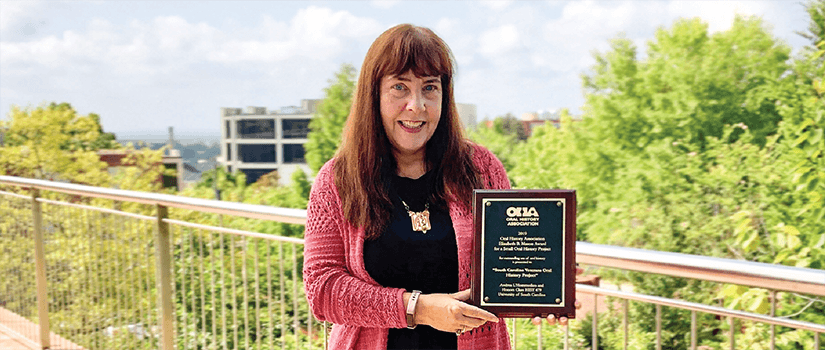“The human voice is very powerful,” says Andrea L’Hommedieu, director of the University Libraries Department of Oral History.
“It’s particularly powerful when you look at the social fabric of our country. The story of one person and their life experiences can be as important as written historical documents,” she says.
L’Hommedieu has been collecting oral histories of individuals since her arrival in 2011 to the 16-year-old Oral History department. The result of her work is thousands of recordings that document history through the voices of people, and much of it is accessible online.
An oral history is exactly what it sounds like. It’s an interview that documents one person’s history, beginning with what shaped and influenced them growing up, includes key moments in their lives, and ends with reflections on their past or plans they’ve got for the future.
Demand for oral histories as a primary research resource has exploded in the past ten years, given how online research has increased exponentially. Through L’Hommedieu’s leadership, the Oral History department has grown from a small archive to a major collection area within University Libraries. She’s spent the past several years focusing on collecting content that is underrepresented within the Libraries’ collections, including the arts, military service and African American and Women’s history.
“My first project with Andrea was very personal to me,” says Jillian Hinderliter, a recent UofSC graduate and recipient of a PhD in history, who worked for L’Hommedieu for six years as a student employee.
“I’d been researching 1970s social justice constructs of Jewish women’s health activism and advocacy, and my first assignment from Andrea was to work on the 1977 International Women’s Year Oral History Collection,” she says.
Hinderliter helped transcribe and digitize the 700-interview collection of recordings made during the 1977 National Women’s Conference in Houston and at the state-level conference in Columbia, South Carolina.
“Through the recordings you can actually feel the energy at the conferences. You can hear the background noise, loudspeaker announcements, you can tell what people cared about, what they were debating, where there was real tension. It hit all the notes for me — the 1970s, women’s empowerment — and six years later, oral history is my primary specialty as a researcher,” she says.
Faculty at UofSC are not strangers to oral history, either. Many have worked throughout the years with L’Hommedieu, who has taught their students how to conduct professional oral histories, and collaborated with her on class projects.
Allison Marsh, a Public History faculty member and oral historian, worked with L’Hommedieu on a project, the Public History Program in the Department of History at UofSC. At 40, UofSC’s Public History program is one of the oldest of its kind in the nation.
As part of her oral history course, Marsh’s students interviewed 36 graduates of the Public History Program, from its inception in the 1970s up to the present. L’Hommedieu’s department then transcribed and edited the interviews, preserved the digital files and built the website.
“Oral histories give us the opportunity to travel through time, check the circumstances and get all of the personal information that might not have been recorded in other documents,” Marsh says. “It’s a way to get more intimate details of things, like motivation, that just don’t exist elsewhere.”
L’Hommedieu is very busy.
In addition to directing the Oral History department, she’s teaching an Honors College class on the history of skateboarding. Her students are now conducting interviews with people involved in the skateboarding scene in Columbia throughout the past 40 years.
“It’s important that the history be preserved, the culture, the stories of the places in Columbia where people skated and what it was like before skateboarding became an Olympic sport,” she says.
“No one else locally has preserved this history, and that’s what we do.”
Her dedication has recently earned L’Hommedieu some serious national and international recognition.
Her George J. Mitchell Oral History Project and Edmund S. Muskie Oral History Project were awarded the Oral History Association’s Elizabeth B. Mason Major Project Award, and her South Carolina Veterans Oral History Collection and University High School (1932 – 1966) Oral History Collection received Elizabeth B. Mason Small Project Awards.
These are impressive achievements, especially since L’Hommedieu is a department of one, herself, and one part-time assistant, making history from the voices of others.
